- Home
- Susan Hill
A Question of Identity (Simon Serrailler 7) Page 3
A Question of Identity (Simon Serrailler 7) Read online
Page 3
Alan Keyes stood, face pale, eyes down, his police minder impassive.
Charlie’s throat constricted suddenly as he looked at him, looked at his hands on the rail. Normal hands. Nothing ugly, nothing out of the ordinary. Not a strangler’s hands, whatever they were supposed to look like. But the hands, resting on the rail, hands like his own, one beside the other resting on the rail, resting on the . . . those hands had . . . Charlie did not think of himself as hard-boiled but you did get accustomed. But nothing prepared you for the first time you saw the man in front of you, ordinary, innocent until proved guilty, however clear his guilt was, nothing prepared you for the sight of a man like Keyes, there in the flesh, a man who had strangled three elderly women. Nothing. He couldn’t actually look at Keyes at all now.
The lawyers sat together, shuffling papers, fiddling with box lids, not looking at one another, not murmuring. Just waiting.
And then the door opened and they were filing back, concentrating on taking their seats, faces showing the strain, or else blank and showing nothing at all. Seven women, five men. Charlie was struck by the expression on the face of the first woman, young with dark hair pulled tightly back, bright red scarf round her neck. She looked desperate – desperate to get out? Desperate because she was afraid? Desperate not to catch the eye of the man in the dock, the ordinary-looking man with the unremarkable hands who had strangled three old women? Charlie watched as she sat down and stared straight ahead of her, glazed, tired. What had she done to deserve the past nine days, hearing appalling things, looking at terrible images? Been a citizen. Nothing else. He had often wondered how people like her coped when it had all been forgotten, but the images and the accounts wouldn’t leave their heads. Once you knew something you couldn’t un-know it. His Dad had tried to un-know what he’d learned about Hindley and Brady for years afterwards.
‘All rise.’
The court murmured; the murmur faded. Everything went still. Every eye focused on the jury benches.
In the centre of the public benches a knot of elderly women sat together. Two had their hands on one another’s arms. Even across the room, Charlie Vogt could see a pulse jumping in the neck of one, the pallor of her neighbour. Behind them, two middle-aged couples, one with a young woman. He knew relatives when he saw them, very quiet, very still, desperate for this to be over, to see justice being done. Hang in there, he willed them, a few minutes and then you walk away, to try and put your lives back together.
Schoolteacher, he thought, as the foreman of the jury stood. Bit young, no more than early thirties. Several of them looked even younger. When he’d done jury service himself, several years ago now, there had only been two women and the men had all been late-middle-aged.
‘Have you reached a verdict on all three counts?’
‘Yes.’
‘On the first count, do you find the accused guilty or not guilty?’ The first murder, of Carrie Gage.
Charlie realised that he was clenching his hand, digging his nails into the palm.
‘Not guilty.’
The intake of breath was like a sigh round the room.
‘Is this a unanimous verdict?’
‘Yes.’
‘On the second count of murder, do you find the accused guilty or not guilty?’ Sarah Pearce.
‘Not guilty.’
The murmur was faint, like a tide coming in. Charlie glanced at the faces of the legal teams. Impassive except for the junior barrister of the defence who had put her hand briefly to her mouth.
‘Is this verdict unanimous?’
‘Yes.’
‘On the third count, do you find the accused guilty or not guilty?’
His Honour Judge Palmer was sitting very straight, hands out of sight, expression unreadable.
‘Not guilty.’
‘Is –’
The gavel came down hard on the bench and the judge’s voice roared out: ‘Order. There must be silence for the clerk to finish his question to the foreman of the jury and for him to reply. If there is not I will clear this court immediately.’ Judge Palmer’s eye glittered. ‘These are the gravest moments of the entire trial and the court must remain silent. Will the clerk now please ask his final question and the foreman give his reply?’
‘Is this verdict unanimous?’
The foreman had been composed. Now, briefly, he looked terrified. ‘Yes.’
The court erupted.
Charlie caught Rod Hawkins’s eye as they both made for the doors through the crowd, trying to beat the rest of the press pack to it. By the time they were outside, the news was ahead of them, the corridors and front lobby of the building seething with people relaying the verdict. The few police on duty outside were calling for backup and getting into position to restrain the crowd and prevent them surging into the front area.
Charlie Vogt stood on the steps listening to the sound of anger that was growing, becoming a roar, like a tide racing in towards the court building.
Rod was beside him. ‘What the fuck . . . That lot are baying for blood. What’s going on in there?’
Without consulting one another, they headed back down the corridor, weaving and dodging through the crowd coming out, others standing about the hall in stunned groups, briefs charging past, gowns flying.
By the time they reached the doors of Court Number 1 the mass of people had left, driven out by the officials. Alan Keyes stood in the centre of a knot of police and clerks, his defence counsel and the rest of the team behind.
‘You can’t stop me,’ Keyes was shouting, his eyes swerving round the group, to the clerk, to the uniforms, to anyone who could hear him. ‘I’m a free man, didn’t you bloody hear? Not guilty, not guilty, not guilty. He said so.’ He pointed to the empty jury benches, then round to the judge’s chair. ‘Not guilty. I’m a free man and I’m going out there to tell them so, I’m walking out those gates, I’m discharged, and you can’t hold me in here.’
The police stood conferring. The barristers looked troubled.
Charlie and Rod stood by the doorway, their presence not noticed in the scrum.
‘He’s right,’ Charlie said.
‘If he goes out through those doors he’ll get torn apart.’
‘Get the fuck out of my way, clod.’ Keyes lurched forward and took a swing at the copper. The blow made no contact, but within seconds Keyes’s hands were behind his back and cuffed. In the middle of yells and curses of protest, he was cautioned by one officer and restrained by two others.
‘Gotcha,’ Rod said. ‘Though they can’t hold him for a fist that didn’t connect.’
But Charlie Vogt was already sprinting for the doors.
She had sandals on with a mended strap which came apart as she ran so that she tripped and almost fell on her face, but didn’t quite, recovered, ran on. She had never moved so fast; she felt like a rugby player dodging this one coming towards her, then that one, then a knot of them together. She ducked and dived, banged her arm against the corridor wall, dodged again, almost pushing over a man carrying a pile of boxes, hearing them crash to the floor as she went on, through a pair of swing doors, down a long corridor where there were fewer people, right to the end, down a short flight of steps. Then there was only the sound of her own running footsteps, the broken sandal slapping unevenly on the tiled floor. She had no idea where she was going but somehow she’d get out, even if it was much later, when they’d all gone. When he’d gone. She’d find an empty room and stay there until the place went quiet, people had all left for home, then try. Nobody would notice her.
Two doors. It reminded her of a corridor at school with classrooms on either side. Both were locked. She stopped to get her breath. From a window high up in the wall, she could hear a muffled sound, like the sea murmuring. A siren, then another came wailing towards the building.
The corridor smelled of chemical cleaner, making her sneeze, and the sneeze seemed to crash around the walls and down the corridor, echoing and re-echoing. She froze, pressing herself agai
nst the wall. Nobody came. It was quiet again.
Then, a corner and another door and when she pushed against it, it swung open. She almost fell inside with relief and leaned on the other side, catching her breath in gulps, shaking. And all she could think of was his face when the words were said.
Not guilty.
And again.
Not guilty.
Not guilty.
As they were spoken, and a second before the whole courtroom exploded, he had half turned his head and looked straight at her and the expression on his face, in his eyes, had frozen her to ice.
Now, the ice was thawing and melting, water ran through her body, and she felt herself sliding slowly down until she was a pool on the floor.
You feel as if the top of your head will blow off. Two minutes after you’ve done it you can do anything. You’re, like, the most powerful person in the universe. You’re God.
‘YOU CAN’T KEEP me here. I’m a free man, you heard, “not guilty”. So I should be walking out there not in here with you. And I want my brief.’
‘Listen –’
‘No, you listen, dickhead –’
‘You can have what you want, Keyes – tea, coffee, something to eat – you can’t have your brief because he’s gone home, and you don’t need your brief because you’re not charged with anything.’
‘You cuffed me, you dragged me down here, I’m not guilty, you heard.’
‘Yes,’ the DI said, ‘I heard.’ He didn’t keep the contempt out of his voice. ‘You attacked a police officer –’
‘I missed. Didn’t get near him. You saw.’
‘Right.’
They were in a small holding room in the basement of the court building. It had a metal table and two chairs. Alan Keyes sat in one, the DI in the other. A uniformed constable stood outside the door.
Alan Keyes stood up and pushed the chair over as the door opened and two more men came in.
‘DCS Granger. Sit down, Keyes –’
‘Mr Keyes to you.’
‘Sit down,’ the Superintendent said, not looking at Keyes.
The other man, who was tall and upright and had a thin moustache, stood beside him. Said nothing. Did not give his name.
‘Now listen –’
‘I want to walk out of this fucking building, I have every right to walk out of –’
‘I said listen. There is no way I can let you walk out. No way. Why do you think you were cuffed and brought down here?’
‘I didn’t bloody touch him, I missed, I only swung at him, it wasn’t –’
‘It had nothing to do with you taking a swing at a police officer – we cuffed you and brought you down here and are keeping you in custody for your own safety.’
‘Piss off.’
‘Because if we’d let you strut out of that court you probably wouldn’t have made it a dozen yards down the corridor, you would have been set upon, battered to death – my guess is you would have lasted three minutes. You’ve got no idea, have you? There’s several hundred angry people out there, and there’d be more arriving if we hadn’t closed the road. You know why, Mr Keyes? That’s right, you can look terrified.’
Keyes twisted his expression back into defiance.
‘I’d be terrified if I was in your shoes. You still want to walk out there? You’re not under arrest, as you say, and I’ve no power to stop you, but it’s my duty to advise you that you should remain under police protection.’
‘You’ll get rid of them, won’t you? Clear the street. Tear gas, water cannon, they’ll bugger off.’ Keyes smiled. ‘I’m an innocent man.’
‘Yes, Mr Keyes. Which won’t prevent the public forming its own judgement and acting accordingly. So I’m advising you to accept police protection . . .’
‘What’s that mean? You put me up in a nice hotel?’
‘We do not.’
‘I’m not going back inside that fu–’
‘Nor in prison custody. You’ll be taken to a place of safety and then we’ll discuss the choices you might have.’
‘What choices? I’m going back home, aren’t I? You can’t stop me, a man’s home is his castle, a man’s –’
‘Shut up, Keyes.’
‘What is this place of safety then? How long do I have to stay?’
‘As I said, you’re not under arrest. We are giving you advice for your own protection. You’re free to take it. Or not. I can’t tell you where you’d go but you would stay until such time as we decide you would be safe to leave. Or make other arrangements.’
‘What other arrangements?’
‘You’ll be given various options within the next few weeks.’
‘Weeks? I’m not staying away from my own home for weeks. You tell the wife where I’ll be, do you?’
‘No.’
‘She’ll wonder then. She’ll report me missing.’
‘We’ll deal with that. Right.’ The Super stood. ‘You’ll be collected in an hour or so.’
‘Now look –’
‘Don’t start again.’ the Super said. ‘I’m beginning to lose patience.’
It was cold. Her leg was numb and her arm painful where it was bent back against the wall. But she knew where she was. After a moment she began to straighten her body cautiously, to sit up, stand.
She never wore a watch. How long had she been – what? Unconscious? Asleep? Why would she be unconscious if she hadn’t hit her head? Or been hit?
She hadn’t. No one had been in here, no one knew where she was. He didn’t. Couldn’t. The toilets were somewhere in the bowels of the building – she had glimpsed them as she ran down endless corridors, through sets of doors, to get away. Get away.
She found the toilet, pulled the door to but didn’t lock it, then went to the basins and splashed her face with a handful of cold water. Pulled her hair out of its band and retied it.
And then there was a clatter outside in the corridor, something metal, and the door opened.
‘It’s all right, I’m going, I’m going . . .’
The cleaner put down his bucket and mop and stood barring the door.
‘You hold on – who are you? You shouldn’t be here. This building’s closed. You on the run?’
‘No. Not like you think.’
‘Like what then?’
Lynne Keyes told him. He was a huge man with a big belly under his overall, a thick neck, big feet, big hands. But he stood still and listened to every word and she felt safe with him. He could have reached out and strangled her without any trouble but she had no fear that he would. They were different sort of men, the stranglers.
‘I hear you. Only you can’t stop here. We go in an hour, place is locked and that’s it.’
‘I can’t go home.’
‘Tell you what, him getting off – it’s shocked everyone rigid.’
She said nothing.
‘So . . .’ He pushed the mop down into the bucket and twisted it this way and that. The smell of pine disinfectant came off it. ‘You must have family. You go to them. Family’s better than friends, times like yours. Come with me, I’ll slip you out the side door, no one’ll be around, and I never saw you, all right?’
She followed him because there was nothing else she could do and because he was kind and she trusted him. The side door had an iron bar that he lifted up and a chain and padlock that he opened. She could see a passageway. Concrete steps.
The door banged and the iron bar came across it on the other side.
Just clocked what it is. They’re afraid. They’re terrified, of me. Everybody is. When I get to walk down that street, they’ll shake with fear. But they’ve got no reason. Well, have they? ‘Not guilty’ he said, didn’t he? ‘Not guilty. Not guilty. Not guilty.’
So what have they got to be afraid of?
‘I . . . I NEED to speak to someone. I need someone to help me.’
‘What department do you want?’
‘I don’t know. Police. Just the police . . . I need help, I’m . . . I’
m scared out of my skull, I daren’t go home . . .’
‘Domestic violence? Hold on.’
He had never let her have a mobile and she thought she hadn’t really minded. Now she did. Now, after she’d walked for ages to find a phone box that worked, she was put on hold. She waited, but she wasn’t put through to anyone else and the woman didn’t come back.
The town was very quiet. A pub on the corner was emptying out, cabs drawing away from the rank. She slipped round the backstreets, across the bus station, in and out of the mesh of streets near the railway line. She felt better because the flat was right on the other side of town. She knew what he’d be doing – she had a sudden flash of him, sitting in the brown leather chair with a can, watching the news. Watching himself on it, smirking, raising his can to the screen.
Lynne Keyes shivered.
The only person left was Hilary. It was a long walk – she had no money for a bus fare, but the last one would have gone anyway. Her sandal strap had broken completely so she had to pinch her toes together to keep it on and there was already one blister on the side of her foot. Walk to Hilary’s? She sat down on the low wall in front of a house. Drawn curtains. Glow from a lamp. Flicker from a TV. She wanted to knock and ask them to let her in.
It took almost an hour to get to Hilary’s because she had to keep stopping to fiddle with her sandal and try and move it away from the blister.
Cumberland Avenue. Nice houses. Not large but modern with decent gardens. She’d wanted to move out this way but he wouldn’t. She’d never properly understood why, until all this had come out. He wouldn’t have been able to get up in the night and slip out, do what he did, slip back, no need for the van.
She dragged herself the last hundred yards to Hilary’s, all the energy gone out of her, but at least the lights were still on. Hilary was seven years younger than her, same dad, different mother. They hadn’t spent a lot of time together when they were younger but they’d picked up later, got on well. She felt such relief walking up the front path it was like heat running through her.

 Mrs De Winter
Mrs De Winter A Question of Identity
A Question of Identity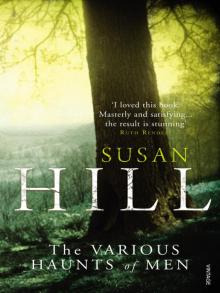 The Various Haunts of Men
The Various Haunts of Men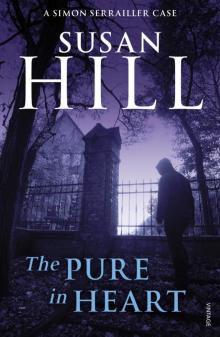 The Pure in Heart
The Pure in Heart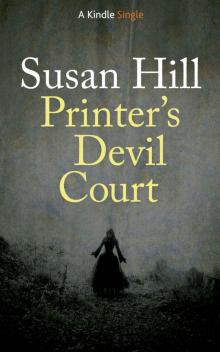 Printer's Devil Court
Printer's Devil Court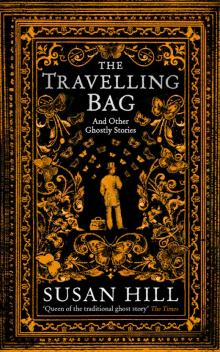 The Travelling Bag
The Travelling Bag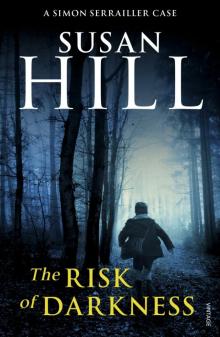 The Risk of Darkness
The Risk of Darkness A Kind Man
A Kind Man Black Sheep
Black Sheep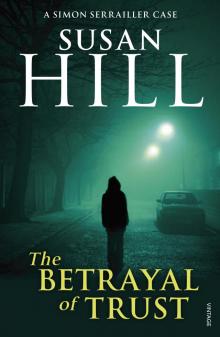 The Betrayal of Trust
The Betrayal of Trust The Service of Clouds
The Service of Clouds Betrayal of Trust
Betrayal of Trust The Small Hand
The Small Hand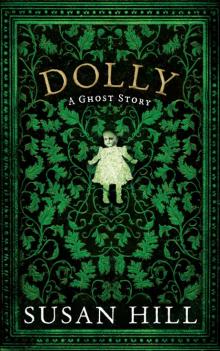 Dolly
Dolly Jacob's Room Is Full of Books: A Year of Reading
Jacob's Room Is Full of Books: A Year of Reading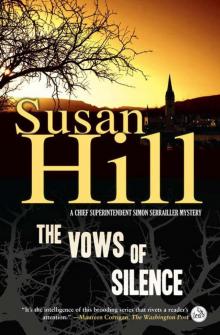 The Vows of Silence
The Vows of Silence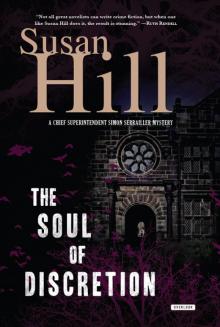 The Soul of Discretion
The Soul of Discretion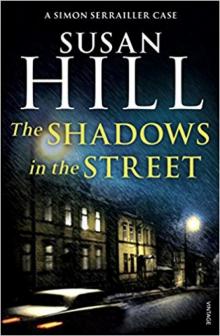 The Shadows in the Street
The Shadows in the Street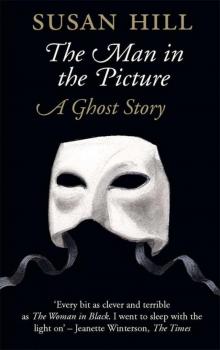 The Man in the Picture
The Man in the Picture Air and Angels
Air and Angels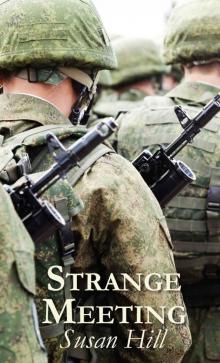 Strange Meeting
Strange Meeting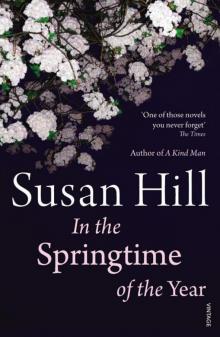 In the Springtime of the Year
In the Springtime of the Year Howards End Is on the Landing: A Year of Reading From Home
Howards End Is on the Landing: A Year of Reading From Home From the Heart
From the Heart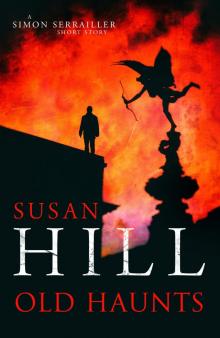 Old Haunts
Old Haunts The Mist in the Mirror
The Mist in the Mirror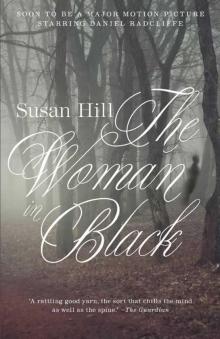 The Woman in Black: A Ghost Story
The Woman in Black: A Ghost Story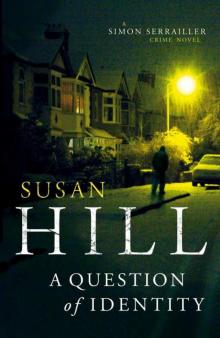 A Question of Identity (Simon Serrailler 7)
A Question of Identity (Simon Serrailler 7)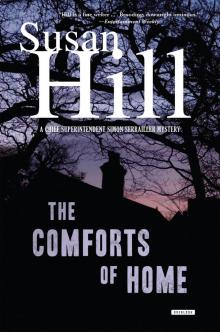 The Comforts of Home
The Comforts of Home Mist in the Mirror
Mist in the Mirror Jacob's Room is Full of Books
Jacob's Room is Full of Books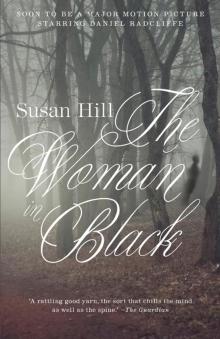 The Woman in Black
The Woman in Black Howards End is on the Landing
Howards End is on the Landing